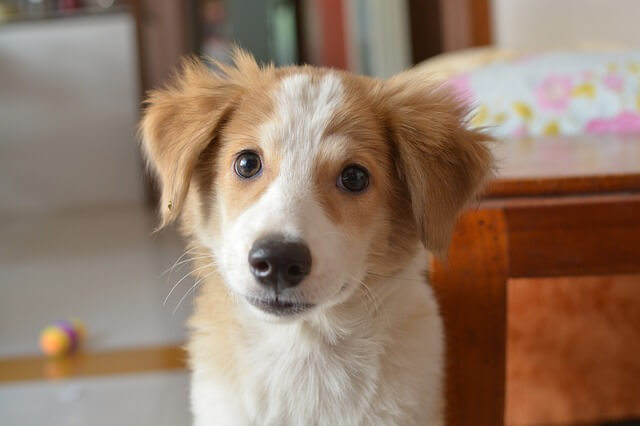Potty Training a Puppy or Adult Dog – 15 Helpful Tips
Housetraining a new puppy or dog can be frustrating and trying at times, but with a little patience and consistency, any dog can easily learn how to go the restroom outside.

The best way to potty train a dog is with a crate. The crate is used for when the dog will be left alone or unsupervised and overnight for bed. The crate creates an atmosphere where most dogs will not have accidents since they sleep there.
If you prefer not to use a crate, you must assign a small, enclosed area to keep your dog during training.
Not all dogs housetrain in the same time frame. Very small or toy dogs take a long time to accurately housetrain as they are anatomically not as developed. It is also a myth that a housetrained dog will automatically tell you it needs to go outside. Many dogs do not unless you give them a system of communication.
The methods of housetraining are almost identical for a puppy or an older adopted dog. The main difference is that puppies are not as mature and take a little longer to physically be able to do it.
Print out a handy Potty Training Schedule to get your puppy ready.
15 Dog Potty Training Tips
Here is what you can do for housebreaking your puppy or adult dog:
1. Make sure you have the right crate. Crates should only be big enough to sit up in, lie down in, and turn around comfortably until he is housebroken. If a dog has too much room in the crate, he can easily sleep and have an accident in the same space.
2. Do not put food and water in the crate. Especially when you will be gone for several hours, you don’t want to leave food and water. He will have to go the bathroom when you are not there.
3. Don’t free feed your dog. Have established dinner times so that he gets on a predictable potty schedule.
4. Limit water and food intake prior to crate time. Before crate time, try to limit food and water for about 1 hour and make sure to walk more than one time.
5. Don’t crate him for longer than 4 hours at a time, if possible. He needs to get out and stretch his legs as well as use the restroom. Consider a dog walker if need be.
6. Use a term for the act of going the bathroom. Something like ‘potty’ works well. Using this word while he goes potty outside will associate the word and action for him. Then, you can ask him ‘If he needs to go potty?’
7. Praise and excitedly reward him with affection when he goes outside. Make sure to wait until he is almost finished or he might quit too soon.
8. Go outside with your dog every time. This is the only way to make sure he has gone, and puppies, especially, forget to go when they are distracted.
9. Get in the habit of walking your dog within 15-30 minutes after mealtimes and drinking, first thing after waking up, first thing when you come home, and any time he has been playing hard with another dog or toys.
10. Never, ever get mad with your dog for an accident in the house. Don’t swat it, yell at it, or rub its nose in it. He will have no idea this is about the accident and instead will become nervous about your actions.
11. Always thoroughly clean up accidents as soon as you can. Clean with enzyme based cleaners. Dogs will always return to the scene of the crime if not cleaned well.
12. Never allow your dog to be unsupervised! If you can’t watch him, you’re in trouble. Dogs will often disappear to go the bathroom out of sight.
13. Watch his body language. Accidents in the house are almost always the fault of the human. Dogs will wander off by themselves, bark, whine, pace, act restless, walk by the door, etc. to indicate a problem.
14. Establish a system of communication. Hanging bells on the door to go outside can be helpful. Ring the bells when you take your dog out and encourage him if he does. Soon, he will hit the bells to tell you he needs outside.
15. Recognize age limitations. Don’t expect your dog to be housetrained overnight. Even puppies that know the routine cannot always wait to do it right. Have patience to work through it.
If you follow through with these tips, you will be well on your way to housetraining your dog.
